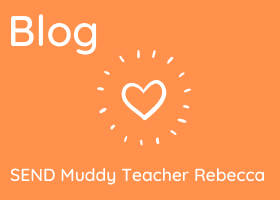By Muddy Teacher Rebecca Butland
Why gardening at school is a must!
Gardening is something that is usually overlooked in schools, however, there are so many areas of learning it should be incorporated into each day. Some of the things it can help develop are: self-confidence, responsibility, independence, teamwork, communication, physical activity, literacy, numeracy, science and, most importantly at the moment, mental wellbeing. However, these are just a few of the things.
School gardens become outdoor classrooms. They can be used for a variety of different lessons and you don’t need fancy tools! Spending time outdoors is so beneficial. Once you have created a space, they can become a place of rest and meditation and a haven from the stress of testing in schools.
I had a class a couple of years ago and when asked, ‘Where do you get potatoes from?’, they answered very confidently, ‘Morrisons!’. How amazing would it have been to plant potatoes with the child and, when harvest time came, cook with the potatoes that they grew themselves. How many more children would try vegetables if they grew them themselves? What a lovely way to find out what fruits and vegetables grow on trees, which grow underground or are the fruit of a plant?
If room allowed, each class could have a planter and the class would be encouraged to work together and communicate to decide what they would like to grow and then help to grow it. Think of all the skills that can be used in deciding upon and researching what they would like to grow, working out what they need, how much it will cost and how to look after the plant.
Different tasks around the garden can promote different skills; weeding and watering plants build motor skills but they also promote responsibility.
Gardening enhances learning for all children. I have taught children with learning disabilities who were reluctant readers and learners in the classroom, however they thrived outdoors. They loved the practical learning element and the sense of achievement seeing what they had grown. If you choose your plants carefully, then there will always be something to touch, taste, smell, hear and see – there are so many sensory experiences!
Get outside, try gardening with the children at your school, what have you got to lose? There is so so much to gain! For me, it’s the lesson I love teaching the most!
Want to start gardening with your school or just interested to find out more?
The RHS Campaign for School Gardening is a good place to get started: https://schoolgardening.rhs.org.uk/home.
Here are 3 top outdoor learning ideas to get you started :
- Make sure the children have the right clothing – bring a muddy bag in or dress for mud that day!
- Make it messy and muddy – why not you are outside!
- Stick to natural resources – less clearing up for you and more kind to the environment.
Our muddy resources support all curriculums and we use only natural resources so any school, anywhere can use our approach. Including Early Years Framework, NC, CfE, American Curriculums.
Looking for a group subscription? We offer big reductions for schools and nurseries that book in groups. The more staff the more the discount per person. Click here for a quote.
Outdoor learning in primary schools is an essential way to bring wellbeing to the classroom.
Here are some muddy top tips to make a start in each key stage.
- Outdoor Learning KS2 – Try taking 10-minute slots or brain breaks in between sessions. Do the Muddy Walk and Talk and just use it for general discussion or chat.
- Outdoor Learning KS1 – Try taking phonics games outside. Choose a sound and use leaves
- Outdoor Learning EYFS – If you can make sure there is an outside space that is accessible and start to reduce the plastic and have more natural objects. Such as leaves they can write on, stones to do art with. Strip back the made plastic objects and keep natural for optimum imagination and creative skills to be used.
- Outdoor Learning KS2 – Try taking 10-minute slots or brain breaks in between sessions. Do the Muddy Walk and Talk and just use it for general discussion or chat.
- Outdoor Learning KS1 – Try taking phonics games outside. Choose a sound and use leaves
- Outdoor Learning EYFS – If you can make sure there is an outside space that is accessible and start to reduce the plastic and have more natural objects. Such as leaves they can write on, stones to do art with. Strip back the made plastic objects and keep natural for optimum imagination and creative skills to be used.
For more outdoor learning ideas for primary schools, sign up for FREE! If it is active learning you are looking for try GoNoodle a great way to get kids moving inside the class.
Watch the MPT safety videos to help you practice the best outdoor learning methods. These videos are also useful for those practising forest school.
Search for more outdoor learning resources : Babies (0-2) | Tots (2-4) | EYFS (4-5) | KS1(5-7) | LKS2( 7-9) | UKS2 (9-11) | Special Needs
For Training head to: Accredited Training | Short Certificate Courses
Have you also checked: Outdoor Ebooks | Assembly Packs | Home Learning Packs | Safety Support | Special Outdoor Events
- Support Outdoor Learning charities and head to Learning through Landscapes who can help with free outdoor learning ideas.
- Institute for Outdoor Learning are also a fabulous charity to refer to if you want to gather ideas for outdoor learning training and organisations.
- Look out for Green Flag Award to promote outdoor learning in primary schools through the muddy puddles approach.


